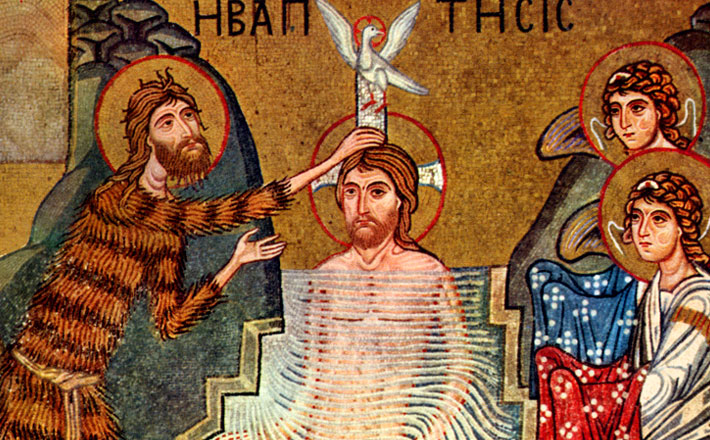Commentary on Luke 3:1-22
Preparation for a major event is key!
Without preparation, we may not receive the full benefits of what is coming. How much more fulfilling if one is prepared, allowing the excitement to build, and preparing one’s mind and heart! Life-changing events may also require a re-organization of priorities. Of course, that requires much more preparation, as people re-configure what really matters in their lives and what should become like “chaff” that a good fire will burn away.
When John the Baptist (Luke 3:1) and Jesus (3:23) begin their public activities, there is a new emperor (Tiberius) and regional governor (Pilate) in leadership. Just as Luke named the Roman leadership during the time of their births (2:1), so now he names the leadership as a way of marking the calendar of when these two Jewish prophets appeared on the public scene.
Prior to this passage, Luke recorded a unique story about the twelve-year old Jesus “sitting among the teachers” in the Temple area and gaining in understanding (Luke 2:47), in wisdom and in divine favor (2:52). Only Luke’s Gospel recorded any story about Jesus’ childhood. And, Luke did not overreach with this tradition, as the later second century, Christian document, The Infancy Gospel of Thomas will do with the same account: “And all men paid heed to him and marveled how that being a young child he put to silence the elders and teachers of the people, expounding the heads of the law and the parables of the prophets … For such glory and such excellence and wisdom we have neither seen nor heard at any time” (19:2, 4).
Following Luke 3:1-22, Jesus’ public activity will begin in earnest, but not before his baptism and God’s announcement (specifically to Jesus) of his pleasure in Jesus. Luke concludes this chapter, following Jesus’ baptism, with a genealogy (a very Jewish marker of identity), which ends with the universal human son, the “son of Adam, son of God.”
Most of this chapter dealt with John’s baptizing mission. Luke viewed this event in light of Isaiah’s narrative of “a voice” who prepares “the way of the Lord.” Indeed, John enters the story as any Israelite prophet would: “the word of God came to John, son of Zechariah” (see also Jeremiah 1:4; 33:1; Ezekiel 1:3; Jonah 1:1;). This priest’s son grew up in the wilderness and entered public life as a prophet. Furthermore, as a prophet he spoke: “You brood of vipers!” (John 3:7). John challenged the special “covenant” Israel had because of Abraham, as if that spiritual heritage was all that mattered (3:8-9). Rather, John questioned what people did. Jesus, too, will provide a prophetic voice and action, as he baptizes “by fire,” which will be utilized for the removal of the “chaff” (3:17).
Repentance should be associated with “acts” of repentance: specifically, John told the crowds to share their goods (Luke 3:11; see also Acts 2) and be fair in one’s profession (3:12-14). Unlike his Gospel counterparts, Luke will specifically name “tax-collectors” and “soldiers” as people who received John’s baptism (see also 7:29). The Baptist did not tell “soldiers” to lay down their weapons; he highlighted their — as well as the collectors’ — potential desire for greed.
Not everyone responds favorably to this prophet from the wilderness. John had made real political enemies, especially Herod who imprisoned him (Luke 3:20) for publically raising concerns about Herod’s marriage to his sister-in-law. This priest-prophet baptizer took the Torah seriously: “You shall not uncover the nakedness of your brother’s wife; it is your brother’s nakedness” (Leviticus 18:16). Because of this challenge, the ruler imprisoned John and removed him from public life. Readers will not hear about John’s death until much later in Luke’s narrative (see also Luke 9:9).
The focus of the chapter concentrates on John’s mission, but the climax was Jesus’ baptism. Yet, the baptism of Jesus is the least significant event of this section. And, Luke was reluctant to place “John” at the scene. Mark’s Gospel displays no concern: “… Jesus came … and was baptized by John in the Jordan” (Mark 1:9). Matthew’s Gospel showed a bit more hesitation: “John would have prevented him, saying, ‘I need to be baptized by you, and do you come to me?’” (Matthew 3:14). Even in “Matthew,” John performed the sacred act, as Jesus consented (Matthew 3:15). The Gospel of John provided no account of Jesus’ baptism at all.
For Luke, the baptism of Jesus occurred among the non-specific crowds of people who received baptism. But no baptizer is named. By implication, readers may assume John the Baptist performed the act. In the narrative story-line, just before Jesus’ baptism, Luke described Herod’s imprisonment of John. Luke was moving back-n-forth in John’s life, not relaying events in time sequence. In narrative time, however, John’s imprisonment seems to occur before Jesus came to be baptized. It is an unusual set-up. In any case, Luke’s narrative avoided the potential embarrassment of one lesser, John, performing the baptism for one greater, Jesus.
For Luke, God’s announcement of Jesus’ identity (as “God’s son”) was the significant event of the baptism, the identity the angel had claimed earlier (Luke 1:35). Here was the first time God had mentioned it directly. By the time of Jesus’ baptism, John’s voice in the wilderness (3:4) was replaced by a heavenly voice (3:22) and John’s body was replaced by the Spirit’s “body” in the form of a dove. John’s absence from the baptism scene emphasizes the Spirit’s “baptism” or empowerment of Jesus and God’s acknowledgement of Jesus’ identity as God’s Son (3:21-22).
As Isaiah announces, the coming Messiah will reveal the “salvation of God” (Luke 3:6). Many contemporary readers of the Gospel narratives usually associate the story of “salvation” with the coming and dying of Jesus. This was clearly one of Luke’s points but the language of “salvation” also means more for first century Jews when Simeon saw God’s “salvation” in the baby Jesus (2:30). For ancient Jews, Zechariah’s words are representative: “(God) has raised up a mighty savior for us … that we would be saved from our enemies and from the hand of all who hate us” (1:69, 71). The Messiah’s salvation would affect their political realities so that their religious ones would also be unhindered, “that we, being rescued from the hands of our enemies, might serve him without fear” (1:74).
Jesus’ public mission initiates a new stage in God’s plan of dealing with humankind. John’s preparatory work is the work of all, involving signs and symbols like baptism that mark the moments of repentance and turning to God. Repentance implies a preparation of one’s heart, mind, and entire attitude that God desires to engage God’s creation. Then, the Spirit will also prepare the way of the Lord!
PRAYER OF THE DAY
Heavenly Father,
With joy and awe we praise you for claiming us as your sons and daughters, and for pouring your Holy Spirit upon us. Help us to prepare this earth for your glory, and shine your light on all your faithful children, for the sake of the one whose birth and baptism brought renewal and transformation to this world, Jesus Christ.
Amen.
HYMNS
On Jordan’s bank the Baptist’s cry ELW 249, H82 76
Songs of thankfulness and praise ELW 310, H82 135
O Morning Star, how fair and bright! ELW 308, UMH 247, NCH 158
How bright appears the morning star H82 496, 497
CHORAL
Gloria! Carolyn Jennings


January 8, 2017